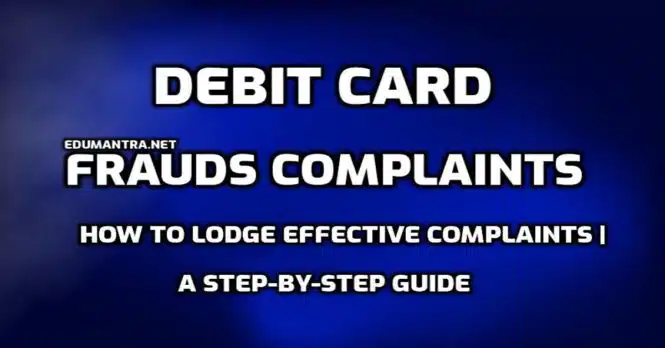
Every year, countless individuals fall victim to fraudulent transactions. Whether it’s unauthorized credit card charges or suspicious bank withdrawals, it’s essential to address these issues promptly. One of the most effective ways to do this is by drafting a fraud transaction complaint letter. In this guide, we’ll walk you through the steps to create compelling and effective debit card frauds complaints and examples of letters to report such incidents.
Debit Card Frauds Complaints
1. Start with Your Personal Details:
Begin your letter by clearly mentioning your name, address, contact number, and the date. This ensures that the concerned authority can reach out to you for any further clarification.
2. Address the Right Authority:
Whether you’re sending the letter to your bank, credit card company, or any other financial institution, ensure you address the right department or official. This can expedite the resolution process.
3. Mention Account Details:
Clearly state your account number, credit card number (last four digits), or any other relevant information. This helps the institution quickly identify and verify your account.
4. Detail the Fraudulent Transaction:
Provide specifics about the unauthorized transaction. Mention the date, amount, transaction ID, and any other pertinent details. The more information you provide, the easier it will be for the institution to investigate.
Also Read:
5. Request Immediate Action:
Express your concern and urge the institution to take immediate action. Whether it’s reversing the transaction, investigating the matter, or ensuring such incidents don’t recur, be clear about your expectations.
6. Attach Supporting Documents:
If you have any evidence or documents that can support your claim, such as transaction receipts or screenshots, attach them with the letter.
7. Conclude Respectfully:
End your fraud transaction complaint letter on a polite note, expressing hope for a swift resolution. Remember to sign the letter.
Sample Complaint Letter Addressing a Debit Card Fraud-
[Your Name]
[Your Address]
[City, Postal Code]
[Date]
[Bank/Branch Name]
[Bank/Branch Address]
[City, Postal Code]
Subject: Complaint Regarding Unauthorized Debit Card Transaction
Dear [Bank Manager’s Name],
I am writing to report an unauthorized transaction made using my debit card, and I am deeply concerned about the security of my funds. I noticed the suspicious activity on [specific date] and immediately wanted to bring it to the bank’s attention.
Debit Card Details:
Card Number: [Last four digits of your card]
– Account Number: [Your Account Number]
Transaction Details:
– Date of Transaction: [specific date]
– Transaction Amount: [specific amount]
– Merchant/Transaction Reference: [if available]
I did not authorize this transaction and have no knowledge of what it pertains to. I request the bank to investigate this matter promptly and ensure such incidents do not recur in the future.
Attached to this letter are copies of my bank statement and other relevant documents highlighting the unauthorized charge. I believe these will assist in the investigation process.
I kindly urge the bank to reverse this transaction and implement necessary measures to safeguard my account. I would also appreciate it if you could keep me updated on the progress of this investigation.
Thank you for your immediate attention to this serious matter. I trust that the bank will handle this with the urgency and seriousness it requires.
Yours faithfully
[Your Signature]
[Your Name]
[Your Contact Number]
This sample letter provides a structured format to address debit card frauds and ensures that all necessary details are included for the bank to take appropriate action.
Conclusion:
Fraudulent transactions can be distressing, but with a well-drafted fraud transaction complaint letter, you can ensure that your concerns are addressed promptly. Always keep a copy of the letter and any correspondence for your records. Stay vigilant and monitor your accounts regularly to safeguard against unauthorized activities.